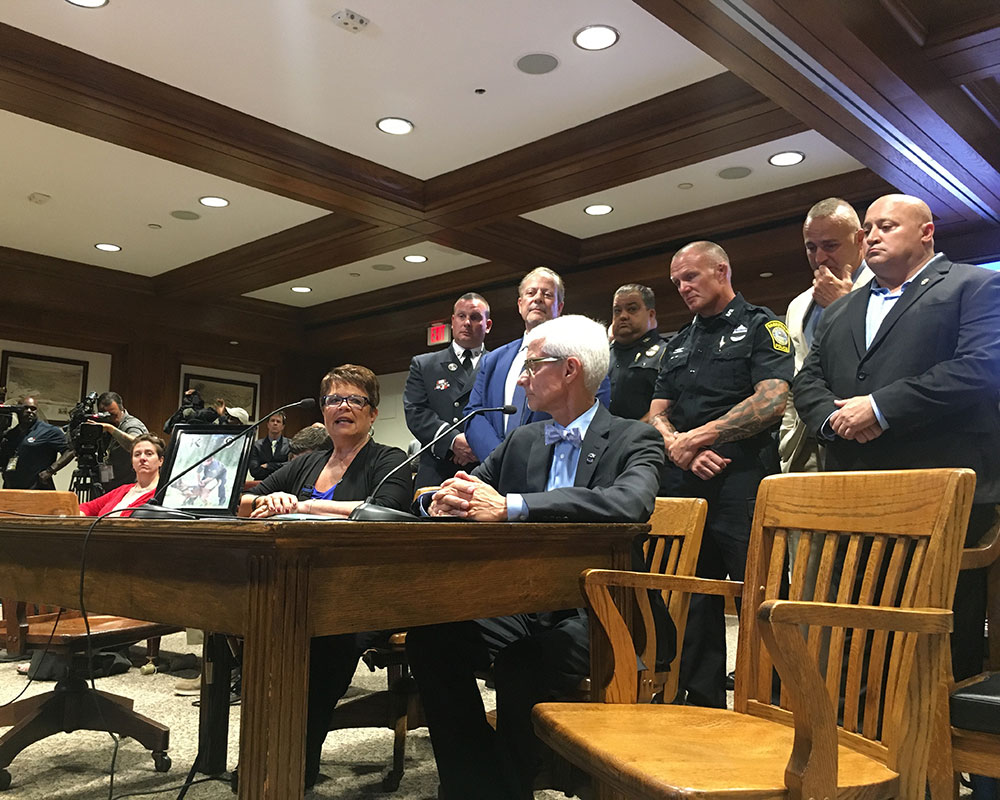Over the sound of police dogs panting, Denise Gannon asked lawmakers to look at two pictures.
She held up one that showed her son, the late Yarmouth police officer Sean Gannon, and his K-9 partner Nero. She said the other, which she passed to a court officer to distribute among Public Safety and Homeland Security Committee members, showed Nero after he was wounded in the 2018 shooting that killed Sgt. Gannon and had to wait hours to receive emergency veterinary care.
“If Sean would have seen that, as any K-9 officer would, he would have been devastated, because they live not only as working partners but as their family members,” Denise Gannon said Thursday, according to the State House News Service. “I would ask each one of you, as members of the committee, who would you leave in your family, in that state, for hours without being attended immediately? This is something we can fix. There are things that happened that can’t change, but we can change this.”
The Gannon family joined other K-9 officers, public safety officials and lawmakers in urging support for legislation filed by Rep. Will Crocker and Sen. Mark Montigny, known as “Nero’s bill,” that would allow emergency medical personnel to treat and transport working animals, provided there is not a human in need they must attend to.
Crocker said the bill grew out of attempts by Cape Cod residents, law enforcement, and the veterinary community “to make something good happen out of something so bad.”
Sgt. Sean Gannon was killed on April 12, 2018 when he, Nero, and other officers from Barnstable and Yarmouth were serving a warrant in Marstons Mills.
Barnstable Sgt. Troy Perry, supervisor of his department’s K-9 unit, said he served as incident commander for all on-scene and canine operations that day, and had to make “the most difficult and unfair decision of my 22-year career” regarding Nero’s treatment.
Perry said he had been informed that Gannon had succumbed to his injuries, and that Nero had been shot in the head while holed up with an armed suspect. Nero was located and rescued in a secondary search, and Perry said there was a “high probability” the dog would not survive the extensive injuries.
Though several ambulances and various rescue personnel were on scene, Perry said neither the equipment or skills were available to Nero because state law prohibits licensed medical professionals from treating or transporting police K-9s.
After what he described as an “eternity of internal debate,” Perry made the call to load Nero into the cramped backseat of a police cruiser with a doctor and a retired K-9 officer, where the two men were able to provide basic treatment while bringing him to an emergency veterinary center in Dennis.
“There isn’t a K-9 handler worth his spit that wouldn’t risk their life for their dog, and frankly, I think we should be ashamed of ourselves, all of us, for not doing this sooner,” Yarmouth K9 handler Michael Kramer said, standing with his dog, Satu. “It’s just a travesty because if we were both hurt, I would want him treated before myself.”

